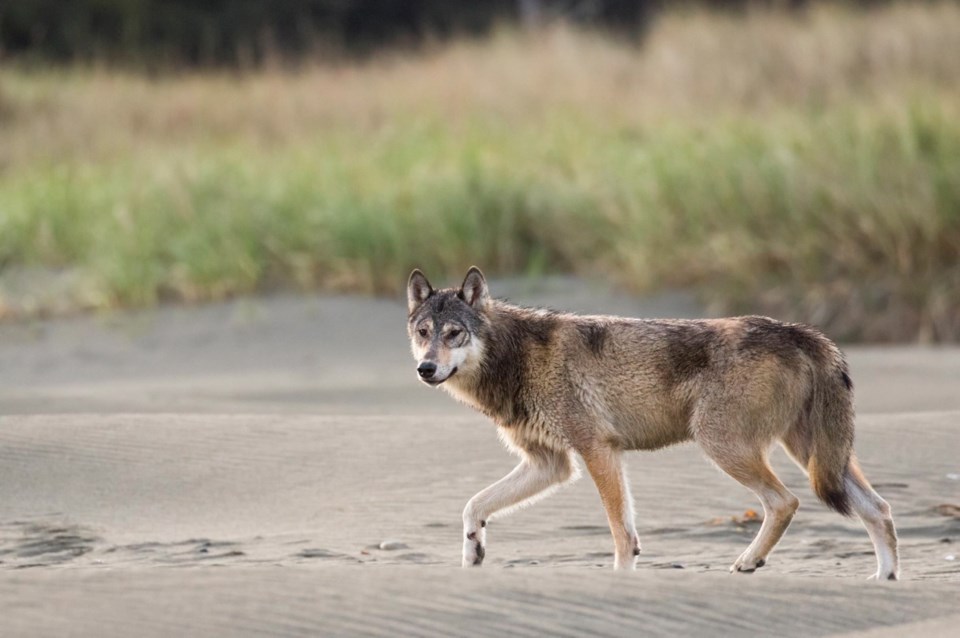A Victoria area hunter with an international reputation for trophy hunting is disputing claims that she wiped out an entire wolf pack in the Sooke area.
Sam Webb, president of Wild Wise Society, said it’s not confirmed, but the pack of about seven animals is believed to be dead because a naturalist who has been monitoring the pack for years using cameras on game trails hasn’t captured video of them in several weeks.
Jacine Jadresko recently shared her intention to remove what she called “a problem wolf pack,” and said in an Instagram post, “full pack removal is always the goal.” She shared photos of herself holding the bodies of two wolves and said she was setting traps.
Through her lawyer, Jadresko said she killed two wolves from a pack in southern Vancouver Island this year but has not hunted or trapped any wolves since.
“The claim that Ms. Jadresko has ‘wiped out’ or ‘killed’ an entire pack, is entirely without basis. Ms. Jadresko has seen the wolves on her own trail cameras as recently as two weeks ago, and has heard from other hunters and property owners that the wolves are still active in the area,” lawyer Eric Pedersen said in an emailed statement on his client’s behalf.
The two wolves were trapped on private property, with permission from the owners and with a valid licence, according to Jadresko’s statement. She said she reported both kills to conservation authorities.
Jadresko was featured in a 2016 Netflix documentary called The Women Who Kill Lions. In the film, she says she has killed 29 species, including an African buffalo and a grizzly bear, in just a year and a half, and has received countless death threats for sharing photos of her kills online.
Concerns about the wolves spurred Sooke Mayor Maja Tait and wildlife advocates to call for a moratorium on wolf hunting.
Webb said if the wolves were killed, that’s not sustainable wildlife management, to remove a group of apex predators.
“They play such an important role in the whole environment, you know, in the whole ecosystem and the balance. And biodiversity is such a such a key factor when you’re talking about a healthy environment, so removing such an integral part of that ecosystem can can be quite detrimental,” Webb said.
The pack wasn’t in conflict with people in the area, and the community is devastated at the thought that the wolves might be gone, she said.
The Conservation Officer Service said of the few calls received during the past year related to wolves in the Sooke-Metchosin area, all were sightings only.
Whether or not the pack in question has been killed, Webb thinks stronger protection for wolves is needed, including a moratorium on wolf hunting on the Island until the population of wolves can be adequately researched. The province estimates there are about 250 wolves on the Island.
Tait said she was saddened by reports that the wolves might have been killed.
“Sooke is wild by nature. That’s a motto that we adopted quite some time ago,” she said, adding the community has worked hard to coexist with wildlife.
Tait has sent a letter to Katrine Conroy, minister of forests, lands, natural resource operations and rural development, expressing support for Oak Bay’s request for a moratorium on recreational wolf hunting and trapping on the Island until more is known about the impact of harvesting practices.
Conroy has previously said she plans to work with the B.C. Wildlife Federation and the B.C. Trappers Association to change regulations “to close this loophole so this type of behaviour is prevented in the future.”
On Vancouver Island, a hunter is allowed to kill three wolves per year, but there’s no limit on how many wolves a trapper can take, according to the Ministry of Forests, Lands, Natural Resource Operations and Rural Development. The province relies on hunters self-reporting.
An average of 18 wolves a year have been killed on the Island through trapping over the past five years, the ministry said.



